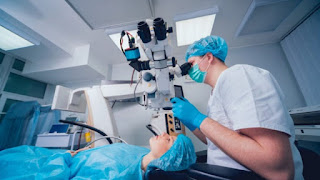LASIK eye surgery

Overview LASIK eye surgery is the best known and most commonly performed laser refractive surgery to correct vision problems. Laser-assisted in situ keratomileusis (LASIK) can be an alternative to glasses or contact lenses. During LASIK surgery, a special type of cutting laser is used to precisely change the shape of the dome-shaped clear tissue at the front of your eye (cornea) to improve vision. In eyes with normal vision, the cornea bends (refracts) light precisely onto the retina at the back of the eye. But with nearsightedness (myopia), farsightedness (hyperopia) or astigmatism, the light is bent incorrectly, resulting in blurred vision. Glasses or contact lenses can correct vision, but reshaping the cornea itself also will provide the necessary refraction. Why it's done LASIK surgery may be an option for the correction of one of these vision problems: Nearsightedness (myopia). When your eyeball is slightly longer than normal or when the cornea cur


